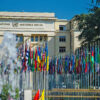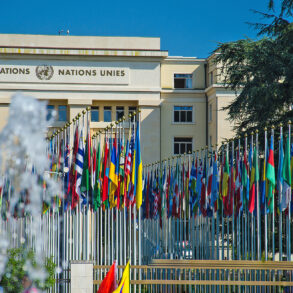For many years, Islam has been represented by symbols, most of which are negative in nature. But in order to understand this religious way of life, we need to look at the essential actions, first and foremost prayer (arab. as-salat).
Photo: Ammar Asfour, The Eye in Islam
It is the cornerstone of Islam. It is the foundation of man’s natural way of life and his relationship with his Lord. Prophet Muhammad, Allah’s blessings and peace be upon him, said about a person’s prayer that insofar as his salat is correct and sincere, his entire life will be equally correct, sincere and successful.
From one point of view, it is an obligation. On the other hand, it is a gift from the Creator of the universe to man. The Qur’an says that prayer prevents indecency and wrongdoing. Socially, the mosque is the manifestation of the Muslim community. It is the place where Muslims gather to pray.
The discipline of Salat five times, prostration before and remembrance of Allah, gratitude and intimacy towards Him, determines purity of character. It protects man from wrong actions. Coming together to establish a place of worship is the sign of the sincerity of a community.
Allah says about Muslims in the Qur’an that they are the best community because they call people to what is right and prevent what is wrong, and because they believe in Allah, establish prayer and pay zakat. The last two are interrelated and both have a spiritual dimension of worshipping God. And both – Salat and Zakat – have a social dimension, the maintenance of an upright and just society.
Because Islam is Deen al-Fitra – the natural pattern of behaviour – it is interesting here that Salat re-establishes that Fitra. I cannot be isolated. Yes, I pray alone, but solitary prayer is for the night and for such moments when the human being needs meditation and reflection and wants closeness to Allah. The wisdom in the revelation of Islam and its five pillars is that they create a pattern of behaviour that, in the case of prayer, breaks the daily routine at times set by Allah.
The most formative of its elements – movements, purification with water, alignment with the direction of prayer (Qibla), covering the body – is the intention in the heart of the believer. The most important element after intention is his time, because this creates a space-time pattern in the individual life and in the life of the community. Therefore, it is evident that salat restores the natural pattern of human behaviour. What prayer does to the Muslim needs to be proven. It can be explained but can only be properly experienced.
Muslims, especially in the West, are heavily conditioned by media and political opinion about Islam. We should turn this on its head. Yes, the media can influence people, but why don’t we change this image through our own media and through our efforts, instead of remaining merely passive-disoriented recipients of this influence? Muslims are charged with demonstrating the beauty, greatness and righteousness of Islam.
One of the things that helps to realise the truth of the Prophetic message is prayer. Just seeing our form of worship can be very moving. It is necessary that we have our own places. This increases visibility and affirmation of integration into our societies. We have no intention of existing on the margins. Our task is central as we hold in our hands answers and remedies to the problems of our post-technological and globalised age.
Prayer, as the fundamental cornerstone of the Din, is the necessary practice that gives health to the mind and soul. It means justice, mercy and charity in the social – all much-needed elements for our cities today.
In our European situation, the mosque has many more dimensions than just for praying. It is the house of Islam, as it was in the first Muslim community. It is the place of comfort and material or spiritual or psychological help. This is where teaching must take place, because it is the natural place for Muslims in Europe to gain knowledge of the Qur’an and Muslim conduct. Festivities such as weddings, the holidays and other events also take place here.
But, beyond that, the mosque must also play a role as a place of encounter and help for non-Muslims. A mosque cannot afford – there are thousands of them in Western Europe – to offer services only to the immigrant Muslim community. This is a serious aberration that indirectly leads to suspicion and rejection in the rest of society.
The mosque must be a beautiful, clean and open place where non-Muslims, schools, politicians, journalists, researchers and neighbours can have real encounters. Muslims must be hospitable to them in every way. This can be organised at certain times. Muslims should offer knowledge in the form of seminars to those, politicians, policemen and others, who deal with them. The presence of Muslims is a new social reality in European countries. There are many aspects of service to the wider society, and I don’t think any mosque in Europe can afford the luxury of not reaching out to the wider community.











